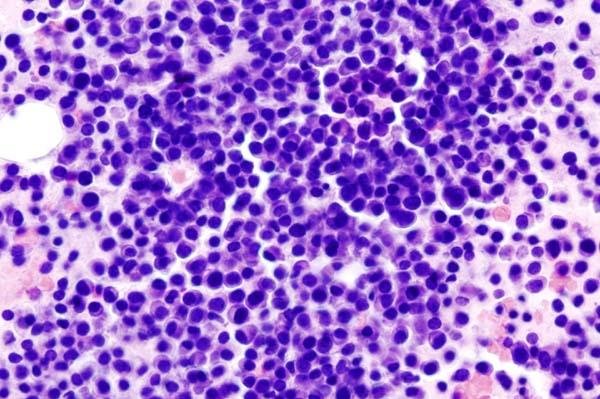This microscopic image shows multiple myeloma in bone marrow. Photo by {link:Wikimedia Commons
: "https://en.wikipedia.org/wiki/Multiple_myeloma#/media/File:Multiple_myeloma_(2)_HE_stain.jpg"}
Oct. 10 (UPI) -- Three specific gene types were associated with two-to-three-fold higher myeloma diagnoses among African-Americans compared with European Americans, according to a study.
Researchers at the Mayo Clinic obtained 1,000 specimens from patients in their genomics laboratory to study the difference among races using DNA analysis. Their findings were published Wednesday in Blood Cancer Journal.
Myeloma is a serious blood disorder in which cells grow too much, forming a mass or tumor in the bone marrow in the center of the bone.
Besides being dominant among African-Americans, it is more frequent among people at least 45 years old and is more likely among men.
Multiple myeloma, the most common form of myeloma, is a cancer of plasma cells. The lifetime risk of getting multiple myeloma is 1 in 132, according to the American Cancer Society. Each year about 30,770 new cases will be diagnosed with about 12,770 deaths.
"We sought to identifying the mechanisms of this health disparity to help us better understand why myeloma occurs in the first place and provide insight into the best forms of therapy," senior author Dr. Vincent Rajkumar, a hematologist at Mayo Clinic, said in a press release.
The researchers studied 881 patients of various racial groups, including 161 self-reported African-Americans and 185 Caucasians. A total of 488 were not self reported.
They found the higher risk of myeloma known to occur in African-Americans was driven by three specific subtypes of the cancer characterized by the presence of genetic translocations in cancer cells.
Translocations, which are genetic abnormalities in cancer cells, are caused by the rearrangement of parts between nonhomologous chromosomes. The translocation researchers identified were t(11;14), t(14;16), and (t14;20).
"Previous efforts to understand this disparity have relied on self-reported race rather than on genetic ancestry, which may have resulted in bias," Rajkumar said. "A major new aspect of this study is that we identified the ancestry of each patient through DNA sequencing, which allowed us to determine ancestry more accurately."
The probability of a person having one of the three specific translocations responsible for myeloma was significantly higher in the 120 patients identified with the highest level of African ancestry compared with the 235 individuals identified with lowest level of African ancestry.
"There are efforts to enroll more minorities in clinical studies, and this is important," Rajkumar said. "However, it is equally, if not more important, to determine the mechanisms of racial disparities in terms of why cancers occur more often in certain racial groups."
He said the finding may "help us determine the mechanism by which myeloma is more common in African-Americans, as well as help us in our quest to find out what causes myeloma in the first place."
In turn, this will will help researchers develop more effective treatment strategies for African-Americans with myeloma, he said.















